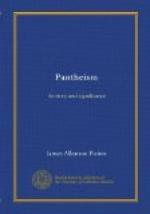[Sidenote: Xenophanes of Elea, about 570 to 480 B.C.]
[Sidenote: His Pantheism Disputed but well Established.]
[Sidenote: His Religion.]
The position of Xenophanes, who, toward the latter part of the sixth century B.C. migrated, apparently for political reasons, in fear of Persian imperialism, from Colophon in Asia Minor to Elea in Italy, was a little different, and, for our purpose, more interesting. For the few fragments which are unfortunately all that is left to us of his philosophical poetry, are strongly suggestive of Pantheism, and the interpretation put upon them by later classical and sub-classical writers, who had his works before them, would appear decisive. True, the distinguished and enlightened scholar, Simon Karsten, who, in the first quarter of the nineteenth century, found a labour of love in collecting and editing the remains of early Greek philosophers, deprecated such a judgment. Yet, while the motives for his special pleading were honourable, seeing the odious misrepresentations of Pantheism still prevalent in the Dutch scholar’s native land,—misrepresentations undissipated even by the splendour of Spinoza,—his protest remains special pleading still. And he himself candidly quotes at large from an alleged work of Aristotle—possibly, only a student’s notes of the latter’s lectures—and also from Simplicius, as reported by Theophrastus in a comment on Aristotle’s Physics, sentences which describe the system of Xenophanos as unquestionably Pantheistic. From, which description I gather that the devout philosopher regarded God as the only real Being, including all that in human language has been, is, and will be, without beginning or end, living and perceiving equally everywhere throughout His infinite essence. And if that essence is compared by Xenophanes to a sphere, neither bounded nor boundless, neither moving nor immovable, this is only because few, if any, in that age of the world, could content themselves with loyally accepting the limits imposed on man by the very nature of things, limits which now compel us to own that, while the Eternal is more real than ourselves, yet, in the strict sense of knowing, He is, from an intellectual standpoint, the Unknowable.
[Sidenote: Extent of his Sympathy with Popular Religion.]
[Sidenote: A Pantheistic Communion Feast.]
This Pantheism did not generate in Xenophanes any arrogant disdain for the religion of his time. For, though he condemned, in words often quoted, the folly which supposed the gods to have the human form, senses, passions and appetites, he was yet glad to worship the divine All as partially manifested in finite beings—perhaps personified powers of nature. Thus among the fragments of his poetry fortunately preserved, is one exquisite gem, a description of a festive repast in the open air. There purity comes first, symbolised by clear floor, clean hands, and spotless dishes. Upon purity waits beauty,




